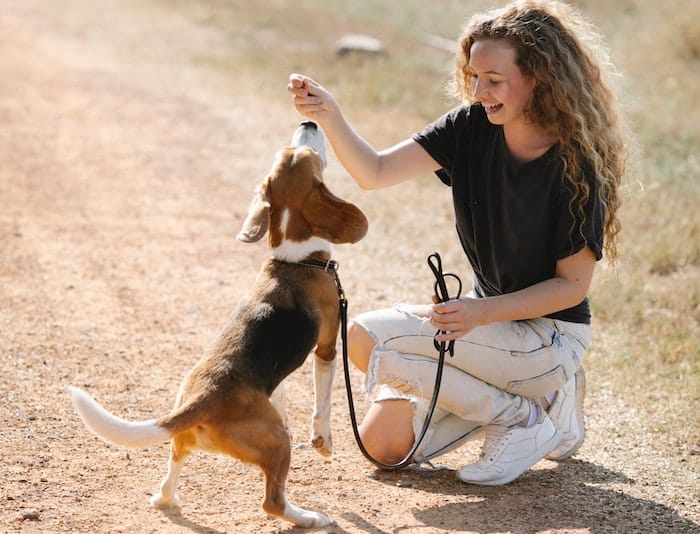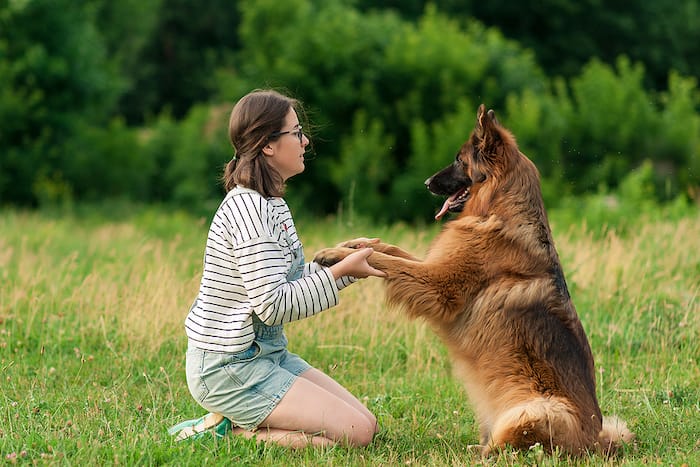A good dog trainer will prioritize the pup’s and the pet parent’s best interests. Their objective is to help create happy homes where dogs are well-behaved and obedient but also fulfilled, confident, and content.
You’ll find this quality with companies like Sit Means Sit in New Albany. At these companies, certified dog trainers strive to strengthen the bond between you and your canine by teaching essential communication skills.
Finding the ideal, competent trainer to fit your puppy’s needs can prove daunting. With due diligence in research, you can avoid those with no real-time experience and few credentials in favor of a professional devoted to the field.
How do you know you need to look for a dog trainer for your pup? Let’s look at a few signs.

Signs You Should Search for a Competent Dog Trainer
Pet parents go above and beyond to ensure their dogs are healthy, content, secure, and safe. Many pups struggle to understand what’s expected of them regarding obedience and proper behavior.
As a pet parent, you can become challenged over time to know how to relay the commands so the dog can understand. The problems can worsen over time until it’s time to consult a dog trainer for support and much-needed direction.
How do you know if you need a certified professional in your situation? Visit https://www.getassist.com/6-signs-you-need-a-dog-trainer-and-how-to-find-one/ to learn how to know you need a dog trainer and how to search for one.
Then follow below for further signs that you should consider reaching out to a professional dog trainer for guidance.
Walks have become a tug-of-war instead of a pleasant experience
Tugging, pulling, and reacting to everything surrounding him has become the course of daily walks, making them stressful, if not somewhat scary. When you have difficulty gaining control while exercising your pup, this is a sign that a consult with a dog trainer is necessary.
Without professional guidance, your dog’s safety and those around him can be jeopardized. If the canine suddenly tugs and breaks away from you, he could:
- Become aggressive and get hurt by another dog
- Get hit by a car
- Get confused and end up lost
- Endure someone pepper spraying him
Leash reactivity has become a problem
Some dogs have triggers that make them react while on the leash. This behavior includes yanking on the leash, lunging, growling, barking, jumping, and sometimes nipping. Usually, if the dog is not confined to the leash, he feels less threatened and doesn’t behave this way.
Many pups gradually develop this issue, but it worsens as time passes until you prefer to play in the yard for exercise and avoid taking walks for your safety and theirs. At this point, a dog trainer needs to intervene since walking is critical for a dog’s well-being.
The trainer can help the dog work through the range of complex issues that lead to leash reactivity, much of which are related to:
- Insecurity, fear and anxiety
- Frustration with the limitations that the leash creates
The trainer will encourage the dog’s confidence in situations that might feel threatening. It takes time and patience, but canines can overcome reactivity with the help of training sessions. View tips for finding a qualified dog trainer.
Your pup has made attempts to nip or bite
Puppies will sometimes nip when playing, but it’s not a habit that should be encouraged or one that you want them to take into adulthood. It can develop into a problem with aggression.
Despite being playful, sharp teeth can inflict pain and injury, particularly with a child. If the pup can’t be redirected using a toy to break the habit, a trainer can develop better behavioral patterns and teach the dog to redirect that energy.
Separation anxiety is becoming an issue
Some pets develop separation anxiety, while other dogs are content being comfortable at home, either alone or with the family.
The problem is challenging to contend with and is one you should consult with a certified dog trainer with experience in dealing with it. This can be particularly troublesome if your pup has the following:
- Works to escape after you’ve gone
- Destroyed property in your absence
- Barkes anxiously when the door is closed
- Is restless and anxious while you’re gone
- Is having accidents in the house
Jumping is troublesome
Many dogs jump and leap when their pet parent returns home or when they become excited about doing something fun. This behavior becomes a problem if the pup does this with a guest, potentially knocking them over or scratching them.
In these cases, the suggestion is to redirect the dog or ignore them when they jump so they don’t get the attention they’re looking for and stop the behavior. If an adult dog, however, isn’t getting the hint, a dog trainer will need to intervene for a long-term solution.
“Resource guarding”
“Resource guarding” is aggressiveness when a dog will growl or snarl, possibly even nip or bite, while guarding an object that they don’t want to have taken away from them. This could be a favorite chew toy, a treat, or any object they become fixated with.
Over time, this aggression can worsen, becoming an issue of safety when you need to take an object away from the pup. When you can’t take items without fear of the dog lashing out in anger, consult a trained professional to modify this behavior at its first sign.

Final Thought
A certified, reputable dog trainer has a dog’s best interest as their priority. A dog will feel secure, confident, and safe at home when he understands what his pet parent wants from him and feels he can please them. In turn, the household is happier and can enjoy their puppy.
Pet parents are often challenged by unwanted behaviors that worsen regardless of their efforts to redirect or correct them. These are the times when a dog trainer’s qualifications benefit both the dog and the home.
They have a keen insight, unique perspective, and proven training to make improvements where we, as pet parents, can’t. If you’re wondering whether you need professional help, the answer has already probably presented itself in one of the scenarios discussed here.
